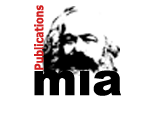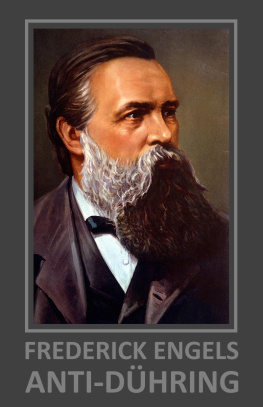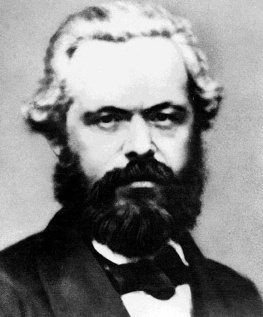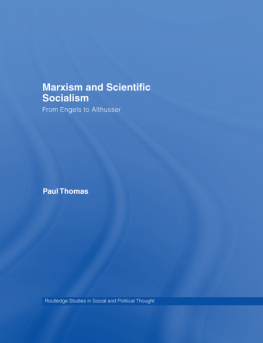Frederick Engels - Socialism: Utopian and Scientific
Here you can read online Frederick Engels - Socialism: Utopian and Scientific full text of the book (entire story) in english for free. Download pdf and epub, get meaning, cover and reviews about this ebook. year: 1892, publisher: Swan Sonnenschein, genre: Religion. Description of the work, (preface) as well as reviews are available. Best literature library LitArk.com created for fans of good reading and offers a wide selection of genres:
Romance novel
Science fiction
Adventure
Detective
Science
History
Home and family
Prose
Art
Politics
Computer
Non-fiction
Religion
Business
Children
Humor
Choose a favorite category and find really read worthwhile books. Enjoy immersion in the world of imagination, feel the emotions of the characters or learn something new for yourself, make an fascinating discovery.
- Book:Socialism: Utopian and Scientific
- Author:
- Publisher:Swan Sonnenschein
- Genre:
- Year:1892
- Rating:5 / 5
- Favourites:Add to favourites
- Your mark:
- 100
- 1
- 2
- 3
- 4
- 5
Socialism: Utopian and Scientific: summary, description and annotation
We offer to read an annotation, description, summary or preface (depends on what the author of the book "Socialism: Utopian and Scientific" wrote himself). If you haven't found the necessary information about the book — write in the comments, we will try to find it.
Socialism: Utopian and Scientific — read online for free the complete book (whole text) full work
Below is the text of the book, divided by pages. System saving the place of the last page read, allows you to conveniently read the book "Socialism: Utopian and Scientific" online for free, without having to search again every time where you left off. Put a bookmark, and you can go to the page where you finished reading at any time.
Font size:
Interval:
Bookmark:
From http://www.marxists.org/archive/marx/works/1880/soc-utop/index.html
Converted to eBook by Andrew Lannan

Written: Between January and March of 1880;
Source: Marx/Engels Selected Works, Volume 3, p. 95-151;
Publisher: Progress Publishers, 1970;
First Published: March, April, and May issues of Revue Socialiste in 1880;
Translated: from the French by Edward Aveling in 1892 (authorised by Engels)
Transcription/Markup: Zodiac/Brian Baggins;
Online Version: Marx/Engels Internet Archive (marxists.org) 1993, 1999, 2003.
Written : May 5 1880;
First published : in a pamphlet: F. Engels, Socialisme utopique et socialisme scientifique, Paris, 1880;
Source : MECW, Volume 24, the first English translation;
Transcribed : by Andy Blunden.
The last page of the manuscript contains a postscript in Marxs handwriting: Dear Lafargue, here is the fruit of my consultation (of yesterday evening) with Engels. Polish the phrases, leaving the gist intact. The introduction was initialled P.L. in the pamphlet. The editors of MECW used Marxs original manuscript and checked it against the text in the pamphlet.
The pages which form the subject of the present pamphlet, first published as three articles in the Revue socialiste, have been translated from the latest book by Engels Revolution in Science [i.e., Anti-Dhring] .
Frederick Engels, one of the foremost representatives of contemporary socialism, distinguished himself in 1844 with his Outlines of a Critique of Political Economy, which first appeared in the Deutsch-Franzsische Jahrbcher, published in Paris by Marx and Ruge. The Outlines already formulates certain general principles of scientific socialism. Engels was then living in Manchester, where he wrote (in German) The Condition of the Working-Class in England (1845), an important work to which Marx did full justice in Capital. During his first stay in England he also contributed as he later did from Brussels to The Northern Star, the official journal of the socialist [i.e. Chartist] movement, and to the New Moral World of Robert Owen.
During his stay in Brussels he and Marx founded the German workers communist club, linked with Flemish and Walloon working mens clubs, and, with Bornstedt, the Deutsche-Brsseler Zeitung. At the invitation of the German committee (residing in London) of the League of the Just, they joined this society, which had originally been set up by Karl Schapper after his flight from France, where he had taken part in the Blanqui conspiracy of 1839. From then on the League was transformed into an international League of Communists after the suppression of the usual formalism of secret societies. Nevertheless, in those circumstances the society had to remain a secret as far as governments were concerned. In 1847 at the International Congress held by the League in London, Marx and Engels were instructed to draft the Manifesto of the Communist Party, published immediately before the February Revolution and translated [at once] into almost all the European languages.
In the same year they were involved in founding the Democratic Association of Brussels, an international and public association, where the delegates of the radical bourgeois and those of the proletarian workers met.
After the February Revolution, Engels became one of the editors of the Neue Rheinische Zeitung (Nouvelle Gazette Rhnane), founded in 1848 by Marx in Cologne and suppressed in June 1849 by a Prussian coup d'tat. After taking part in the rising at Elberfeld Engels fought in the Baden campaign against the Prussians (June and July 1849) as the aide-de-camp of Willich, who was then colonel of a battalion of francs-tireurs.
In 1850, in London, he contributed to the Review of the Neue Rheinische Zeitung edited by Marx and printed in Hamburg. There Engels for the first time published The Peasant War in Germany, which 19 years later appeared again in Leipzig as a pamphlet and ran into three editions.
After the resumption of the socialist movement in Germany, Engels contributed to the Volksstaat and Vorwarts his most important articles, most of which were reprinted in the form of pamphlets such as On Social Relations in Russia, The Prussian Schnapps in the German Reichstag, The Housing Question, The Cantonalist Rising in Spain, [The Bakunists at Work] etc.
In 1870, after leaving Manchester for London, Engels joined the General Council of the International, where he was entrusted with the correspondence with Spain, Portugal and Italy.
The series of final articles which he contributed to the Vorwrts under the ironic title of Herr Dhrings Revolution in Science (in response to the allegedly new theories of Mr. E. Dhring on science in general and socialism in particular) were assembled in one volume and were a great success among German socialists. In the present pamphlet we reproduce the most topical excerpt from the theoretical section of the book, which constitutes what might be termed an introduction to scientific socialism.
In the 1880 French edition of the pamphlet Lafargue added here: The Communist Manifesto is one of the most valuable documents of modern socialism; even today it remains one of the most vigorous and clearest expositions of the development of bourgeois society and the formation of the proletariat which must put an end to capitalist society; as in The Poverty of Philosophy by Marx, published a year earlier, here, for the first time, the theory of class struggle is clearly formulated.
The 1880 edition has socialist instead of proletarian here.
The 1880 edition has and Palatinate inserted here.
Source : MECW Volume 24, pp. 457-9;
First published : in F. Engels, Die Entwicklung des Sozialismus von der Utopie zur Wissenschaft, Hottingen-Zurich, 1882;
The following work is derived from three chapters of my book: Herrn E. Drings Umwalzung der Wissenschaft, Leipzig, 1878. I put them together for my friend Paul Lafargue for translation into French and added a few extra remarks. The French translation revised by me appeared first in the Revue socialiste and then independently under the title: Socialisme utopique et socialisme scientifique, Paris, 1880. A rendering into Polish made from the French translation has just appeared in Geneva and bears the title: Socyjalizm utopijny a naukowy, Imprimerie de lAurore, Genve, 1882.
The surprising success of the Lafargue translation in the French-speaking countries and especially in France itself forced me to consider the question whether a separate German edition of these three chapters would not likewise be of value. Then the editors of the Zurich Sozialdemokrat informed me that a demand was generally being raised within the German Social-Democratic Party for the publication of new propaganda pamphlets, and they asked me whether I would not apply those three chapters to this purpose. I was naturally in agreement with that and put my work at their disposal.
It was, however, not originally written for immediate popular propaganda. How could what was in the first place a purely scientific work be suitable for that, What changes in form and content were required?
Font size:
Interval:
Bookmark:
Similar books «Socialism: Utopian and Scientific»
Look at similar books to Socialism: Utopian and Scientific. We have selected literature similar in name and meaning in the hope of providing readers with more options to find new, interesting, not yet read works.
Discussion, reviews of the book Socialism: Utopian and Scientific and just readers' own opinions. Leave your comments, write what you think about the work, its meaning or the main characters. Specify what exactly you liked and what you didn't like, and why you think so.












